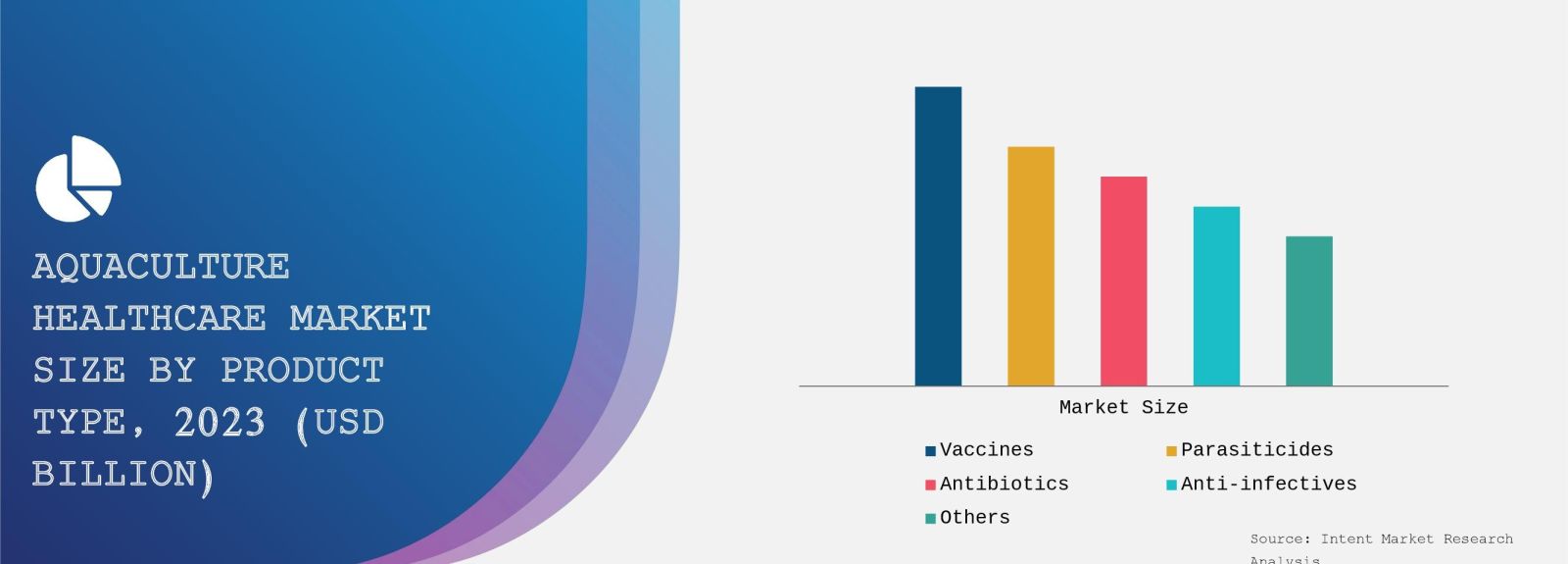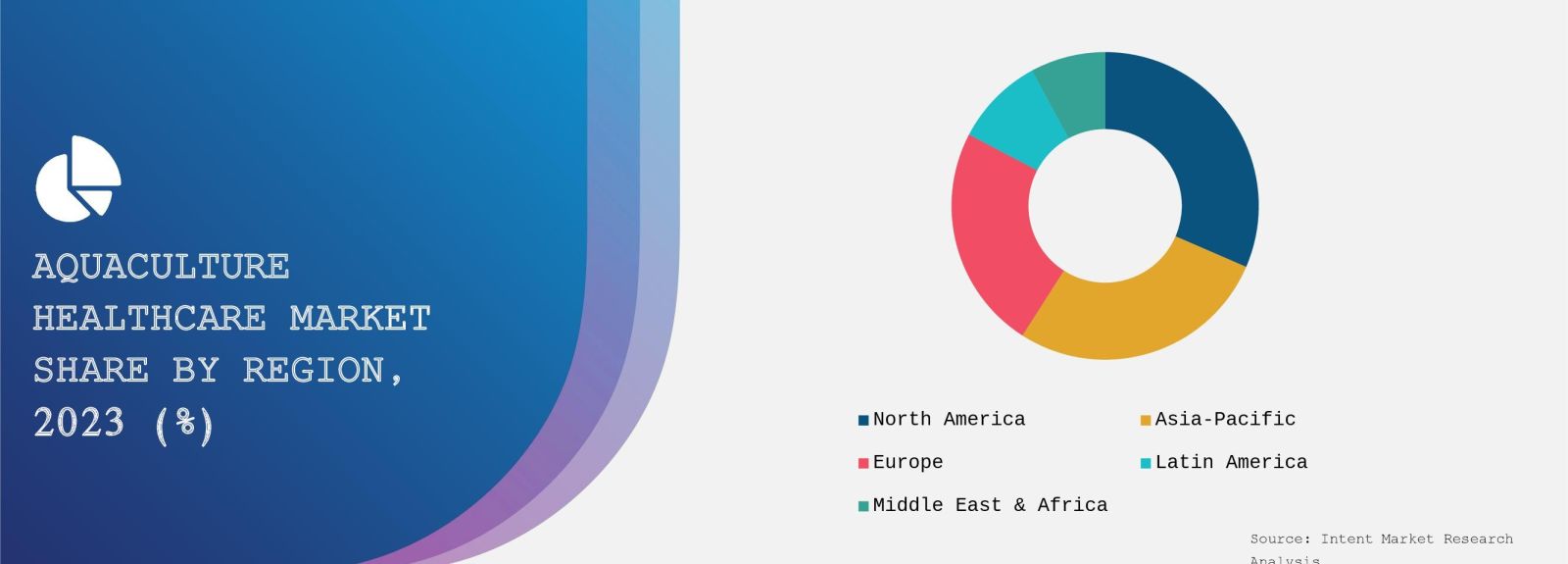As per Intent Market Research, the Aquaculture Healthcare Market was valued at USD 2.7 billion in 2023 and will surpass USD 4.4 billion by 2030; growing at a CAGR of 7.3% during 2024 - 2030.
Vaccines Segment is Anticipated to Grow the Fastest Owing to Disease Prevention Focus in Aquaculture
The Vaccines segment is projected to grow rapidly within the aquaculture healthcare market, driven by the increasing need to prevent and control infectious diseases in farmed fish and other aquatic species. Vaccines provide a cost-effective solution to protect large populations from outbreaks, reducing the dependency on antibiotics and other drugs. This shift aligns with the global movement towards sustainable aquaculture practices and the demand for healthier, antibiotic-free seafood products.
Recent advancements in vaccine technologies, including DNA and recombinant vaccines, are enhancing the efficiency of disease prevention in aquaculture. These innovations, along with rising awareness of biosecurity measures, are expected to further fuel the growth of this segment. As the aquaculture industry expands to meet the growing global demand for seafood, the vaccines segment is poised to lead market growth.

Asia-Pacific is Set to be the Largest Region Driven by Aquaculture Industry Growth
Asia-Pacific is anticipated to be the largest region in the aquaculture healthcare market, owing to the significant expansion of the aquaculture industry in countries like China, India, Indonesia, and Vietnam. The region is the world's largest producer of farmed seafood, and the increasing focus on improving animal health in aquaculture is driving the demand for healthcare solutions such as vaccines, antibiotics, and parasiticides.
Government initiatives promoting sustainable aquaculture practices, combined with rising seafood consumption and exports, are contributing to the region’s market dominance. Additionally, the prevalence of aquaculture diseases and the need to ensure food safety are pushing producers to adopt more advanced healthcare solutions. With continued investments in aquaculture infrastructure and research, Asia-Pacific is expected to remain a leading player in the global market.

The report focuses on estimating the current market potential in terms of the total addressable market for all the segments, sub-segments, and regions. In the process, all the high-growth and upcoming technologies were identified and analyzed to measure their impact on the current and future market. The report also identifies the key stakeholders, their business gaps, and their purchasing behavior. This information is essential for developing effective marketing strategies and creating products or services that meet the needs of the target market. The report also covers a detailed analysis of the competitive landscape which includes major players, their recent developments, growth strategies, product benchmarking, and manufacturing operations among others. Also, brief insights on start-up ecosystem and emerging companies is also included as part of this report.
Report Objectives:
The report will help you answer some of the most critical questions in the Aquaculture Healthcare Market. A few of them are as follows:
- What are the key drivers, restraints, opportunities, and challenges influencing the market growth?
- What are the prevailing technology trends in the Aquaculture Healthcare Market?
- What is the size of the Aquaculture Healthcare Market based on segments, sub-segments, and regions?
- What is the size of different market segments across key regions: North America, Europe, Asia-Pacific, Latin America, Middle East & Africa?
- What are the market opportunities for stakeholders after analyzing key market trends?
- Who are the leading market players and what are their market share and core competencies?
- What is the degree of competition in the market and what are the key growth strategies adopted by leading players?
- What is the competitive landscape of the market, including market share analysis, revenue analysis, and a ranking of key players?
Report Scope:
|
Report Features |
Description |
|
Market Size (2023) |
USD 2.7 billion |
|
Forecasted Value (2030) |
USD 4.4 billion |
|
CAGR (2024 – 2030) |
7.3% |
|
Base Year for Estimation |
2023 |
|
Historic Year |
2022 |
|
Forecast Period |
2024 – 2030 |
|
Report Coverage |
Market Forecast, Market Dynamics, Competitive Landscape, Recent Developments |
|
Segments Covered |
Aquaculture Healthcare Market By Product Type (Vaccines, Parasiticides, Antibiotics, Anti-infectives), By Species (Fish, Crustaceans, Mollusks), By Route of Administration (Oral, Injectable, Topical, Immersion), By End-user (Fish Farms, Veterinary Clinics) |
|
Regional Analysis |
North America (US, Canada, Mexico), Europe (Germany, France, UK, Italy, Spain, and Rest of Europe), Asia-Pacific (China, Japan, South Korea, Australia, India, and Rest of Asia-Pacific), Latin America (Brazil, Argentina, and Rest of Latin America), Middle East & Africa (Saudi Arabia, UAE, Rest of Middle East & Africa) |
|
Customization Scope |
Customization for segments, region/country-level will be provided. Moreover, additional customization can be done based on the requirements |
|
1. Introduction |
|
1.1. Market Definition |
|
1.2. Scope of the Study |
|
1.3. Research Assumptions |
|
1.4. Study Limitations |
|
2. Research Methodology |
|
2.1. Research Approach |
|
2.1.1. Top-Down Method |
|
2.1.2. Bottom-Up Method |
|
2.1.3. Factor Impact Analysis |
|
2.2. Insights & Data Collection Process |
|
2.2.1. Secondary Research |
|
2.2.2. Primary Research |
|
2.3. Data Mining Process |
|
2.3.1. Data Analysis |
|
2.3.2. Data Validation and Revalidation |
|
2.3.3. Data Triangulation |
|
3. Executive Summary |
|
3.1. Major Markets & Segments |
|
3.2. Highest Growing Regions and Respective Countries |
|
3.3. Impact of Growth Drivers & Inhibitors |
|
3.4. Regulatory Overview by Country |
|
4. Aquaculture Healthcare Market, by Product Type (Market Size & Forecast: USD Million, 2022 – 2030) |
|
4.1. Vaccines |
|
4.2. Parasiticides |
|
4.3. Antibiotics |
|
4.4. Anti-infectives |
|
4.5. Others |
|
5. Aquaculture Healthcare Market, by Species (Market Size & Forecast: USD Million, 2022 – 2030) |
|
5.1. Fish |
|
5.2. Crustaceans |
|
5.3. Mollusks |
|
5.4. Others |
|
6. Aquaculture Healthcare Market, by Route of Administration (Market Size & Forecast: USD Million, 2022 – 2030) |
|
6.1. Oral |
|
6.2. Injectable |
|
6.3. Topical |
|
6.4. Immersion |
|
7. Aquaculture Healthcare Market, by End-user (Market Size & Forecast: USD Million, 2022 – 2030) |
|
7.1. Fish Farms |
|
7.2. Veterinary Clinics |
|
7.3. Others |
|
8. Regional Analysis (Market Size & Forecast: USD Million, 2022 – 2030) |
|
8.1. Regional Overview |
|
8.2. North America |
|
8.2.1. Regional Trends & Growth Drivers |
|
8.2.2. Barriers & Challenges |
|
8.2.3. Opportunities |
|
8.2.4. Factor Impact Analysis |
|
8.2.5. Technology Trends |
|
8.2.6. North America Aquaculture Healthcare Market, by Product Type |
|
8.2.7. North America Aquaculture Healthcare Market, by Species |
|
8.2.8. North America Aquaculture Healthcare Market, by Route of Administration |
|
8.2.9. North America Aquaculture Healthcare Market, by End-user |
|
8.2.10. By Country |
|
8.2.10.1. US |
|
8.2.10.1.1. US Aquaculture Healthcare Market, by Product Type |
|
8.2.10.1.2. US Aquaculture Healthcare Market, by Species |
|
8.2.10.1.3. US Aquaculture Healthcare Market, by Route of Administration |
|
8.2.10.1.4. US Aquaculture Healthcare Market, by End-user |
|
8.2.10.2. Canada |
|
8.2.10.3. Mexico |
|
*Similar segmentation will be provided for each region and country |
|
8.3. Europe |
|
8.4. Asia-Pacific |
|
8.5. Latin America |
|
8.6. Middle East & Africa |
|
9. Competitive Landscape |
|
9.1. Overview of the Key Players |
|
9.2. Competitive Ecosystem |
|
9.2.1. Level of Fragmentation |
|
9.2.2. Market Consolidation |
|
9.2.3. Product Innovation |
|
9.3. Company Share Analysis |
|
9.4. Company Benchmarking Matrix |
|
9.4.1. Strategic Overview |
|
9.4.2. Product Innovations |
|
9.5. Start-up Ecosystem |
|
9.6. Strategic Competitive Insights/ Customer Imperatives |
|
9.7. ESG Matrix/ Sustainability Matrix |
|
9.8. Manufacturing Network |
|
9.8.1. Locations |
|
9.8.2. Supply Chain and Logistics |
|
9.8.3. Product Flexibility/Customization |
|
9.8.4. Digital Transformation and Connectivity |
|
9.8.5. Environmental and Regulatory Compliance |
|
9.9. Technology Readiness Level Matrix |
|
9.10. Technology Maturity Curve |
|
9.11. Buying Criteria |
|
10. Company Profiles |
|
10.1. Benchmark Holdings |
|
10.1.1. Company Overview |
|
10.1.2. Company Financials |
|
10.1.3. Product/Service Portfolio |
|
10.1.4. Recent Developments |
|
10.1.5. IMR Analysis |
|
*Similar information will be provided for other companies |
|
10.2. Ceva Santé Animale |
|
10.3. Dechra Pharmaceuticals |
|
10.4. Elanco |
|
10.5. HIPRA |
|
10.6. Merck & Co |
|
10.7. Phibro Animal Health |
|
10.8. Veterquimica |
|
10.9. Virbac |
|
10.10. Zoetis |
|
11. Appendix |
A comprehensive market research approach was employed to gather and analyze data on the Aquaculture Healthcare Market. In the process, the analysis was also done to analyze the parent market and relevant adjacencies to measure the impact of them on the Aquaculture Healthcare Market. The research methodology encompassed both secondary and primary research techniques, ensuring the accuracy and credibility of the findings.
.jpg)
Secondary Research
Secondary research involved a thorough review of pertinent industry reports, journals, articles, and publications. Additionally, annual reports, press releases, and investor presentations of industry players were scrutinized to gain insights into their market positioning and strategies.
Primary Research
Primary research involved conducting in-depth interviews with industry experts, stakeholders, and market participants across the Aquaculture Healthcare ecosystem. The primary research objectives included:
- Validating findings and assumptions derived from secondary research
- Gathering qualitative and quantitative data on market trends, drivers, and challenges
- Understanding the demand-side dynamics, encompassing end-users, component manufacturers, facility providers, and service providers
- Assessing the supply-side landscape, including technological advancements and recent developments
Market Size Assessment
A combination of top-down and bottom-up approaches was utilized to analyze the overall size of the Aquaculture Healthcare Market. These methods were also employed to assess the size of various subsegments within the market. The market size assessment methodology encompassed the following steps:
- Identification of key industry players and relevant revenues through extensive secondary research
- Determination of the industry's supply chain and market size, in terms of value, through primary and secondary research processes
- Calculation of percentage shares, splits, and breakdowns using secondary sources and verification through primary sources
.jpg)
Data Triangulation
To ensure the accuracy and reliability of the market size, data triangulation was implemented. This involved cross-referencing data from various sources, including demand and supply side factors, market trends, and expert opinions. Additionally, top-down and bottom-up approaches were employed to validate the market size assessment.
NA
